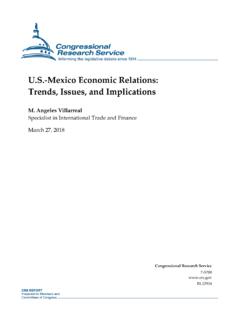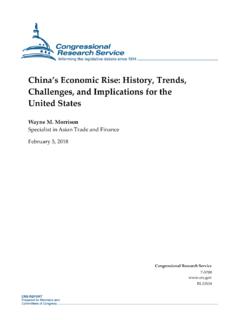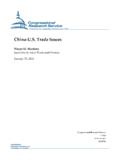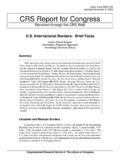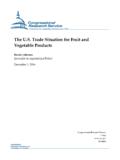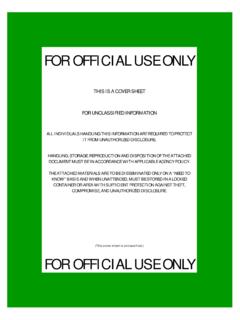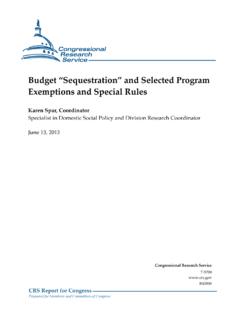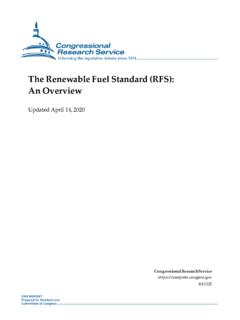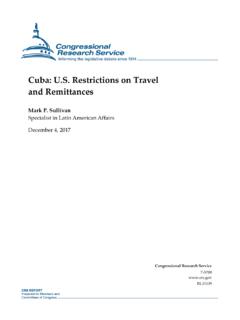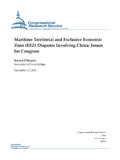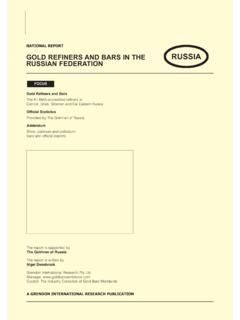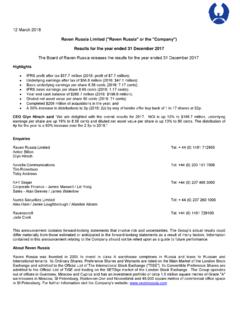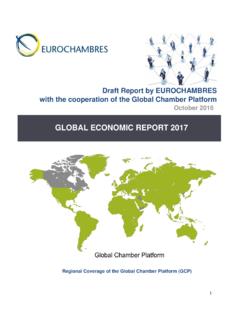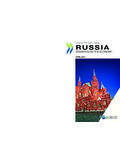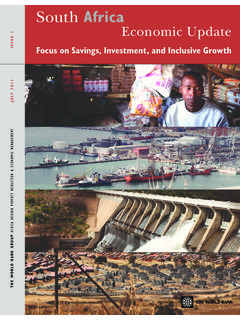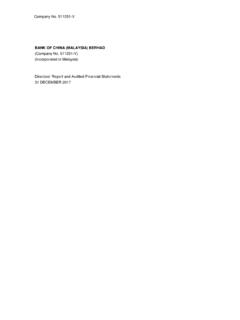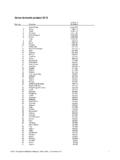Transcription of U.S. Sanctions and Russia's Economy
1 Sanctions and russia s Economy Rebecca M. Nelson Specialist in International Trade and Finance February 17, 2017 Congressional Research Service 7-5700 R43895 Sanctions and russia s Economy Congressional Research Service Summary In response to russia s annexation of the Crimean region of neighboring Ukraine and its support of separatist militants in Ukraine s east, the United States imposed a number of targeted economic Sanctions on russian individuals, entities, and sectors. The United States coordinated its Sanctions with other countries, particularly the European Union (EU). russia retaliated against Sanctions by banning imports of certain agricultural products from countries imposing Sanctions , including the United States. policymakers are debating the use of economic Sanctions in foreign policy toward russia , including whether Sanctions should be kept in place or further tightened.
2 A key question in this debate is the impact of the Ukraine-related Sanctions on russia s Economy and economic interests in russia . economic Conditions in russia russia faced a number of economic challenges in 2014 and 2015, including capital flight, rapid depreciation of the ruble, exclusion from international capital markets, inflation, and domestic budgetary pressures. Growth slowed to in 2014 before contracting sharply by in 2015. The extent to which and EU Sanctions drove the downturn is difficult to disentangle from the impact of a dramatic drop in the price of oil, a major source of export revenue for the russian government, or economic policy decisions by the russian government. The International Monetary Fund (IMF) estimated in 2015 that and EU Sanctions in response to the conflict in Ukraine and Russia's countervailing ban on agricultural imports reduced russian output over the short term by as much as Russia's Economy , more recently, is showing some signs of recovery, in part due to higher oil prices, a flexible exchange rate regime, and sizeable foreign exchange reserves, among other factors.
3 The IMF projects russia s Economy will grow by in 2017. economic Interests When the Sanctions were announced in 2014, business groups raised concerns that Sanctions harm American manufacturers, jeopardize American jobs, and cede business opportunities to firms from other countries. When the Sanctions were rolled out in 2014, news reports cited a number of firms that were adversely affected by Sanctions on russia and russia s retaliatory measures. There are questions about the overall impact of the Sanctions on the Economy , however. russia accounts for a small portion of total trade and foreign investment. Sanctions also target a specific russian individuals and entities and, in some cases, restrict only specific types of economic transactions. Sanctions and russia s Economy Congressional Research Service Contents Introduction .. 1 Sanctions in Response to the Ukraine Conflict.
4 2 economic Implications for russia .. 3 Recent Trends in russia s Economy .. 4 Estimates of the Sanctions Impact on the russian Economy .. 7 economic Interests .. 8 Trade and Investment Relations .. 9 economic Ties at the Firm Level .. 11 Conclusion .. 13 Figures Figure 1. economic Trends in russia .. Error! Bookmark not defined. Figure 2. Foreign Bank Loans to russia .. 7 Figure 3. Inward Foreign Direct Investment in russia .. 7 Figure 4. Merchandise Trade with russia .. 9 Figure 5. and EU economic Ties with russia .. 10 Contacts Author Contact Information .. 14 Sanctions and russia s Economy Congressional Research Service 1 Introduction Over the course of 2014, the government rolled out targeted economic Sanctions on russian individuals and entities in critical commercial sectors in response to that country s annexing of the Crimean region of neighboring Ukraine and its support of separatist militants in Ukraine s Designed to change behavior of the russian government by putting pressure on the russian Economy , Sanctions include asset freezes for specific russian individuals and entities; restrictions on financial transactions with russian firms operating in key sectors; restrictions on exports, services, and technology for specific russian oil exploration or production projects; and tighter restrictions on exports of dual-use and military items to russia .
5 The United States coordinated its Sanctions with other countries, particularly with the European Union (EU). russia retaliated against Sanctions by banning imports of certain agricultural products from countries imposing Sanctions , including the United States. policymakers are debating the use of economic Sanctions in foreign policy toward russia , including whether Sanctions should be kept in place or further tightened. For example, in the Senate, legislation has been introduced to impose additional Sanctions in response to russia s alleged hacking of persons and institutions, including political organizations, and other aggressive actions, including in Ukraine (S. 94), and to provide congressional oversight of actions that would limit russia Sanctions (S. 341, 1059). Legislation has also been introduced in the House to tighten Sanctions , for example by prohibiting certain transactions in areas controlled by russia ( 830), and to prohibit recognition of russian sovereignty over Crimea ( 463).
6 Some Members of Congress have proposed codifying existing Sanctions , which could make them more difficult to ease or Most of the current restrictions were put in place by President Barak Obama issuing Executive Orders under emergency authorities. On February 2, 2017, UN Ambassador Nikki Haley opened her first public remarks by referring to a recent flare-up of violence in Ukraine, noting that the dire situation in eastern Ukraine is one that demands clear and strong condemnation of russian actions. She stated that the United States continues to condemn and call for an immediate end to the russian occupation of Crimea and that Crimea-related Sanctions will remain in place until russia returns control of the peninsula to Ukraine. 3 A key question in this debate is the impact of the Ukraine-related Sanctions on russia s Economy and economic interests in russia .
7 The subsequent discussion on recent economic trends in russia and economic ties with russia may provide insight. 1 For more information on Ukraine-related Sanctions , see CRS In Focus IF10552, Sanctions on russia Related to the Ukraine Conflict, coordinated by Cory Welt. A number of russian individuals and entities are also subject to economic Sanctions related to human rights violations, corruption, conflict in Syria, terrorism, transnational crime, and weapons proliferation. For more information on the different types of Sanctions on russia individuals and entities, see CRS Insight IN10634, Overview of Sanctions Regimes on russia , by Cory Welt and Dianne E. Rennack and CRS In Focus IF10576, The Global Magnitsky Human Rights Accountability Act, by Dianne E. Rennack. In December 2016, the Obama Administration imposed additional Sanctions on russian individuals and entities in response to malicious cyber activity, including relating to the election process.
8 For more information, see CRS Insight IN10635, russia and the Presidential Election, by Catherine A. Theohary and Cory Welt. 2 For example, see S. 94, Senator John McCain, Statement by SASC Chairman John McCain on President Trump s Phone Call with Vladimir Putin, January 27, 2017. 3 Ambassador Nikki Haley, Remarks at a UN Security Council Briefing on Ukraine, Mission to the United Nations, February 2, 2017, at Sanctions and russia s Economy Congressional Research Service 2 Sanctions in Response to the Ukraine Conflict The Obama Administration first imposed Sanctions relating to the events in Ukraine in March 2014, and announced additional Sanctions over subsequent months, working in coordination with the EU. The Obama Administration explained that the targeted Sanctions on specific individuals, firms, and sectors aim to increase russia s political isolation as well as the economic costs to russia , especially in areas of importance to President Putin and those close to him.
9 4 In 2014, Congress also passed, and President Obama signed into law, the Support for the Sovereignty, Integrity, Democracy, and economic Stability of Ukraine Act of 2014 ( 113-95; 22 8901 et seq.) and the Ukraine Freedom Support Act of 2014 ( 113-272; 22 8921 et seq.). These Acts contain provisions on Sanctions in response to the conflict in Sanctions on russia in response to the Ukraine conflict include: Asset freezes and prohibitions against transactions with specific russian individuals. The government has frozen assets under jurisdiction and prohibited persons from engaging in transactions with a number of russian individuals, including russian officials, deputies, businesspeople, and associates with ties to the Kremlin. Asset freezes and prohibitions against transactions with specific entities. Some russian companies are subject to asset freezes and are prohibited from engaging in economic transactions with individuals and entities.
10 Examples include Bank Rossiya, which has been called the personal bank of Putin; the Volga Group, a holding company owned by a close ally of Putin; and Almaz-Antey, a state-owned defense Restrictions on financial transactions with russian firms operating in key sectors. Sanctions target sectors in russia s financial services, energy, and defense sectors. individuals and entities face restrictions on select financial transactions, such as prohibitions on extending new debt with maturities longer than 30 or 90 days (depending on the sector). Examples of russian firms subject to these Sanctions include Rosoboronexport, a state-owned arms exporter; Rosneft, a state-owned oil company and the world s largest publicly-traded oil producer; Rostec, a major russian hi-tech and defense conglomerate; and Sberbank, the largest bank in russia . Restrictions on specific oil-related exports, services, and technology to russia .
